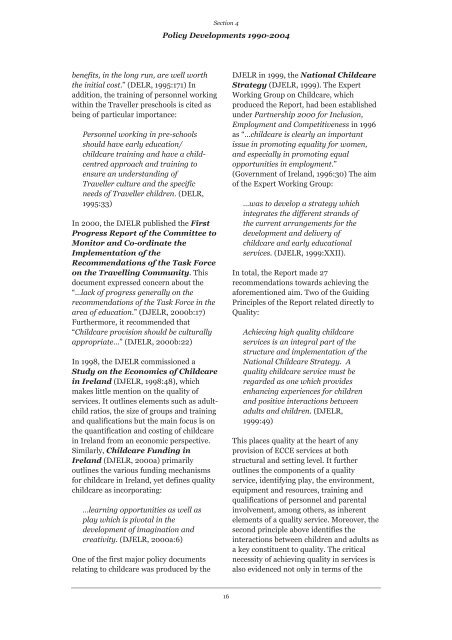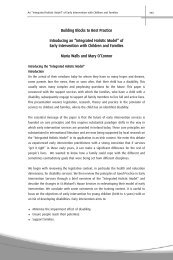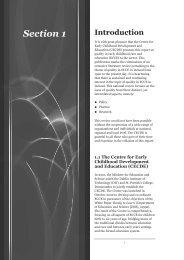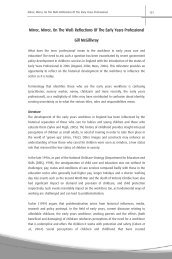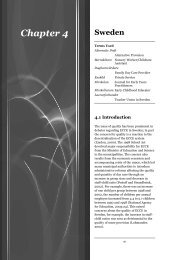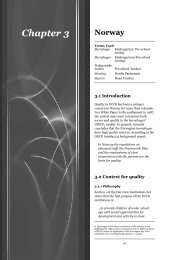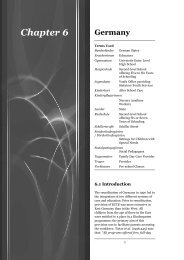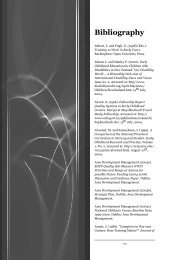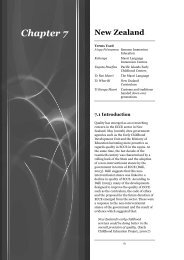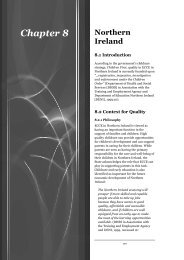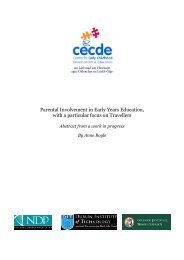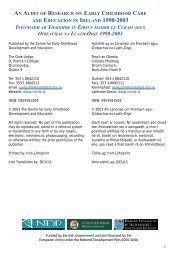Policy Developments 1990-2004 - Centre for Early Childhood ...
Policy Developments 1990-2004 - Centre for Early Childhood ...
Policy Developments 1990-2004 - Centre for Early Childhood ...
You also want an ePaper? Increase the reach of your titles
YUMPU automatically turns print PDFs into web optimized ePapers that Google loves.
Section 4<strong>Policy</strong> <strong>Developments</strong> <strong>1990</strong>-<strong>2004</strong>benefits, in the long run, are well worththe initial cost.” (DELR, 1995:171) Inaddition, the training of personnel workingwithin the Traveller preschools is cited asbeing of particular importance:Personnel working in pre-schoolsshould have early education/childcare training and have a childcentredapproach and training toensure an understanding ofTraveller culture and the specificneeds of Traveller children. (DELR,1995:33)In 2000, the DJELR published the FirstProgress Report of the Committee toMonitor and Co-ordinate theImplementation of theRecommendations of the Task Forceon the Travelling Community. Thisdocument expressed concern about the“…lack of progress generally on therecommendations of the Task Force in thearea of education.” (DJELR, 2000b:17)Furthermore, it recommended that“Childcare provision should be culturallyappropriate…” (DJELR, 2000b:22)In 1998, the DJELR commissioned aStudy on the Economics of Childcarein Ireland (DJELR, 1998:48), whichmakes little mention on the quality ofservices. It outlines elements such as adultchildratios, the size of groups and trainingand qualifications but the main focus is onthe quantification and costing of childcarein Ireland from an economic perspective.Similarly, Childcare Funding inIreland (DJELR, 2000a) primarilyoutlines the various funding mechanisms<strong>for</strong> childcare in Ireland, yet defines qualitychildcare as incorporating:…learning opportunities as well asplay which is pivotal in thedevelopment of imagination andcreativity. (DJELR, 2000a:6)One of the first major policy documentsrelating to childcare was produced by theDJELR in 1999, the National ChildcareStrategy (DJELR, 1999). The ExpertWorking Group on Childcare, whichproduced the Report, had been establishedunder Partnership 2000 <strong>for</strong> Inclusion,Employment and Competitiveness in 1996as “…childcare is clearly an importantissue in promoting equality <strong>for</strong> women,and especially in promoting equalopportunities in employment.”(Government of Ireland, 1996:30) The aimof the Expert Working Group:…was to develop a strategy whichintegrates the different strands ofthe current arrangements <strong>for</strong> thedevelopment and delivery ofchildcare and early educationalservices. (DJELR, 1999:XXII).In total, the Report made 27recommendations towards achieving thea<strong>for</strong>ementioned aim. Two of the GuidingPrinciples of the Report related directly toQuality:Achieving high quality childcareservices is an integral part of thestructure and implementation of theNational Childcare Strategy. Aquality childcare service must beregarded as one which providesenhancing experiences <strong>for</strong> childrenand positive interactions betweenadults and children. (DJELR,1999:49)This places quality at the heart of anyprovision of ECCE services at bothstructural and setting level. It furtheroutlines the components of a qualityservice, identifying play, the environment,equipment and resources, training andqualifications of personnel and parentalinvolvement, among others, as inherentelements of a quality service. Moreover, thesecond principle above identifies theinteractions between children and adults asa key constituent to quality. The criticalnecessity of achieving quality in services isalso evidenced not only in terms of the16


